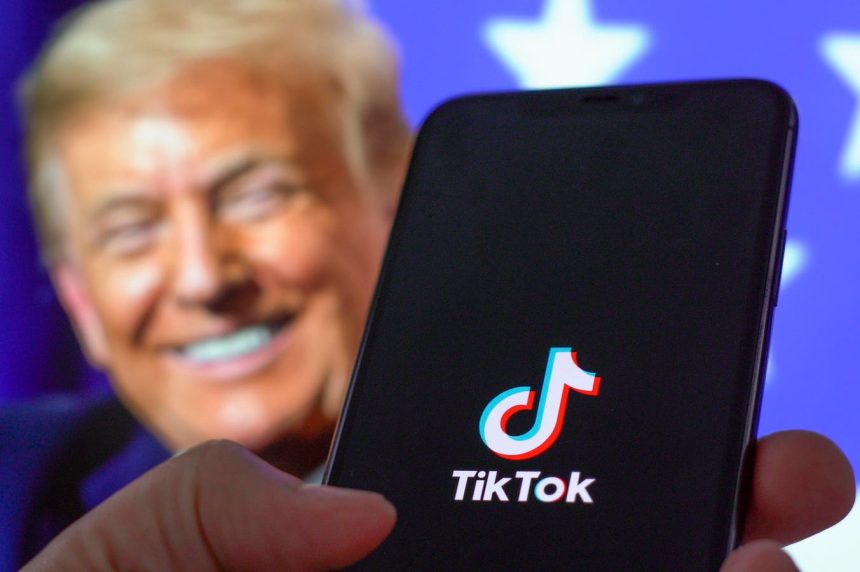The fate of TikTok in the United States hangs precariously in the balance, caught between legal battles, political maneuvering, and the looming deadline of a ban set for January 19th. TikTok’s parent company, ByteDance, has filed an emergency request with the Supreme Court to stay a law mandating its sale to a non-Chinese entity or face a nationwide ban. This legal volley comes on the heels of a meeting between TikTok CEO Shou Zi Chew and President-elect Donald Trump, adding another layer of complexity to the already intricate saga. While TikTok seeks legal reprieve, the situation presents a unique political opportunity for Trump, who could potentially leverage the ban to his advantage, further complicating the app’s future.
The crux of the matter lies in a law passed in April, granting ByteDance 270 days to divest TikTok to a non-Chinese buyer. Instead of complying, ByteDance opted for a legal challenge, arguing that the law infringes upon First Amendment rights. However, the DC Circuit Court of Appeals upheld the law’s constitutionality, asserting its necessity in safeguarding American free speech – a paradoxical interpretation of the First Amendment. The court’s denial of TikTok’s request to halt the ban’s implementation has now propelled the case to the Supreme Court. ByteDance argues that even a temporary shutdown would inflict significant damage, disrupting lucrative advertising contracts, deterring potential business partnerships, and accelerating the exodus of content creators from the platform.
The Supreme Court’s decision on the stay request presents an intricate political chess game. While the court could grant the injunction as a gesture towards Trump, the incoming president might paradoxically benefit from the ban taking effect under the outgoing Biden administration. This scenario would allow Trump to seemingly “rescue” TikTok, fulfilling a campaign promise and garnering positive public perception. By utilizing his authority to grant a one-time, three-month extension for the sale – a provision within the law – Trump could reinstate the app shortly after assuming office, portraying himself as the savior of TikTok while simultaneously shifting any future blame for a potential ban back to ByteDance.
This calculated political maneuver places ByteDance in a precarious predicament. While a three-month extension would provide temporary relief, it clashes with their steadfast refusal to sell TikTok. ByteDance’s ultimate goal is to maintain operational control of the app, and the extension could serve as a window of opportunity to persuade Trump to accept an alternative solution short of a full divestment. However, the law explicitly restricts Trump’s ability to approve agreements addressing national security concerns, such as the data sharing limitations and algorithm audits proposed by ByteDance through “Project Texas.”
The legal constraints on Trump’s authority complicate any potential compromise. The law explicitly prohibits maintaining any operational relationship with entities controlled by a “foreign adversary,” effectively barring collaboration on content recommendation algorithms or data sharing agreements. While Trump could potentially disregard the law, as he has demonstrated a propensity to do in the past, such a move carries significant risks. The law stipulates hefty fines for American companies – including tech giants like Google, Apple, Oracle, and Amazon – that assist in keeping TikTok operational in violation of the ban. Given these substantial financial penalties, a simple social media post or even an executive order may not be enough to convince these companies to reinstate the app.
Should Trump attempt to circumvent the law, American companies might seek legal clarification from the courts to protect themselves from potential fines. This would create further legal entanglement and uncertainty, highlighting the precarious position of American companies caught in the crossfire of a political and legal battle. They are compelled to navigate the complexities of complying with the law while also considering the potential consequences of defying a presidential directive. This delicate balancing act underscores the significant impact of the TikTok ban on the broader tech landscape.
The intricate interplay of legal challenges, political maneuvering, and corporate interests creates a complex and unpredictable situation for TikTok’s future in the U.S. The Supreme Court’s impending decision on the stay request will be a pivotal moment, potentially influencing the app’s fate and setting the stage for further legal and political battles. Regardless of the outcome, the TikTok saga highlights the increasing tensions surrounding data security, national security, and the power dynamics between governments and tech companies in the digital age. The case also serves as a microcosm of the broader debate about the balance between free speech, national security, and the role of government regulation in the rapidly evolving digital landscape.



